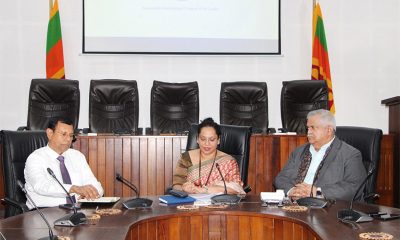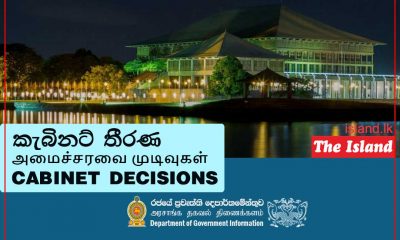Business
Accelerating Sustainable Finance in SL through private sector participation

Sri Lanka declared its commitment to achieving the 17 Sustainable Development Goals (SDGs) in 2015. Since then, the country has made several national pledges and commitments to achieve environmental, social and economic goals in line with the SDGs. These ambitious commitments require greener and more sustainable capital markets and financial systems and a private sector investing in environmental and social priority sectors.
While the link between climate-related goals and finance may not be immediately apparent, the financial sector is an important leverage point for a sustainable transformation. Investments aligned with a country’s climate goals can make an important contribution to environmental and climate protection.
In line with the current and evolving global and regional trends and opportunities, accessing the untapped potential of the sustainable finance market can only be done through empowering financial sector institutions and corporate leaders through comprehensive competence and knowledge development on climate-relevant issues and priorities and their interrelationships with the financial sector and investment choices.
Environment, Social and Governance (ESG) is often used in business as a key metric in making investment decisions and also serves as a reference for companies reporting the impacts of their businesses. ESG has become a globally recognized consideration in investment decision-making and is increasingly the focus of companies’ strategic and operational agendas. With issues such as climate change, ethical supply chains, environmental damage and global welfare becoming more critical, investors and regulators are now focused on ESG aspects that positively contribute to solving current global issues.
Many economies, especially in Asia, have implemented different policies to incentivize the private sector to issue green bonds. In Asia and the Pacific, financial entities are the main issuers of green bonds having a 50% share in the market compared to 17% share of the governments. Global cooperation and international standardization have had a positive impact on the issuance of private green bonds.
Countries like Indonesia have implemented a series of sustainable finance initiatives as an effort to create an inclusive and globally competitive capital market. The Indonesia Stock Exchange (IDX), became a part of the Sustainable Stock Exchanges and launched ESG focused indices, aiming to improve the transparency of listed companies’ ESG performance and to drive the implementation of SDGs as a part of Investor’s decision-making process.
Recent research has found that green investments significantly contribute to businesses’ green innovation. Therefore, in addition to bridging the SDGs funding gap, a sustainable capital market will facilitate green innovation, which is fundamental to keeping pace with the global economy.
In view of above, a 3-day Sustainable Finance training targeting the private sector stakeholders was successfully conducted recently by the Central Bank of Sri Lanka in partnership with the Sustainable Development Council, the United Nations Economic and Social Commission for Asia and the Pacific (UNESCAP), the Global Green Growth Institute (GGGI) and the Luxembourg Green Exchange (LGX) and LGX Academy (the world’s first and leading exchange dedicated to sustainable finance) in Colombo.
The objective of the training was to support the private sector in developing a better understanding of sustainable finance instruments, best practices on compliance, and ESG risk identification and management. To build staff capacity in both government and the private sector to understand sustainable finance as a distinct segment of the market, increased awareness of various emerging asset classes, and enhanced cooperation between the public and private sectors are citical. Strong links between financial markets and key actors in the real economy can create an enabling environment that looks at sustainable finance as the new business-as-usual.
Delivering the Opening Remarks at the event, the Senior Deputy Governor of the Central Bank, T. M.Y.J.P Fernando stated that sustainable finance has ceased to be a mere aspiration; it has become a necessity and as the main regulator of the financial sector, the Central Bank is committed to creating an enabling environment for the advancement of sustainable finance in Sri Lanka through laying the necessary foundations and the private sector must build upon the initiatives and drive the momentum forward, benefitting from efforts of the financial sector institutions to green the economy.
Speaking at the event, the Director General of the Sustainable Development Council, Chamindry Saparamadu highlighted that developing greener and sustainable capital markets and financial systems and channeling private capital flows towards environmental and social priorities are vital to achieve country’s development goals whilst remaining within the planetary boundaries. Ms Saparamadu further noted that this requires all key stakeholders ie regulators, financial sector institutions, and corporate leaders to work with a shared vision and understanding.
The training was attended by representatives from Banks, Non-bank Financial Institutions, Insurance Companies, leading Business Chambers and officials from the Central Bank and the Securities and Exchange Commission,
Business
HNB Finance bags 2 CMA Reporting Awards 2025

HNB Finance PLC has been honoured with two prestigious accolades at the CMA Excellence in Integrated Reporting Awards 2025, reaffirming the company’s commitment to transparency, good governance, and integrated business performance.
At this year’s ceremony, HNB Finance PLC was awarded Second Runner Up – joint in the category of “Best Integrated Report , Finance and Leasing Sector”, and also received a Merit Award in recognition of its continued efforts to enhance reporting quality and strengthen stakeholder communication.
The CMA Excellence in Integrated Reporting Awards, organised annually by the Institute of Certified Management Accountants (CMA) of Sri Lanka, acknowledge organisations that demonstrate superior financial reporting standards aligned with global best practices. Winners are assessed on key criteria such as financial performance and strategic management, corporate governance and compliance, innovation and digital transformation, sustainability practices, and professional excellence.
Chaminda Prabhath, Managing Director/CEO of HNB Finance PLC, commented on the recognition, “These awards reaffirm our commitment to upholding the highest standards of integrated reporting and transparent financial disclosure. At HNB Finance, we remain focused on delivering sustainable long-term value through robust governance frameworks, prudent financial management, and continuous innovation. The acknowledgement by CMA Sri Lanka reflects the disciplined efforts of our teams across the organization and motivates us to further enhance our reporting quality, strengthen ESG integration, and reinforce our stakeholder centric approach.”
Business
ComBank joins ‘Liya Shakthi’ scheme to further empower women-led enterprises
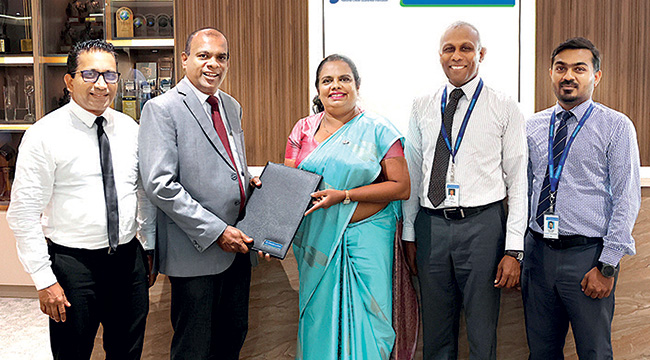
The Commercial Bank of Ceylon has reaffirmed its long-standing commitment to advancing women’s empowerment and financial inclusion, by partnering with the National Credit Guarantee Institution Limited (NCGIL) as a Participating Shareholder Institution (PSI) in the newly introduced ‘Liya Shakthi’ credit guarantee scheme, designed to support women-led enterprises across Sri Lanka.
The operational launch of the scheme was marked by the handover of the first loan registration at Commercial Bank’s Head Office recently, symbolising a key step in broadening access to finance for women entrepreneurs.
Representing Commercial Bank at the event were Mithila Shyamini, Assistant General Manager – Personal Banking, Malika De Silva, Senior Manager – Development Credit Department, and Chathura Dilshan, Executive Officer of the Department. The National Credit Guarantee Institution was represented by Jude Fernando, Chief Executive Officer, and Eranjana Chandradasa, Manager-Guarantee Administration.
‘Liya Shakthi’ is a credit guarantee product introduced by the NCGIL to facilitate greater access to financing for women-led Micro, Small, and Medium Enterprises (MSMEs) that possess viable business models and sound repayment capacity but lack adequate collateral to secure traditional bank loans. Through NCGIL’s credit guarantee mechanism, Commercial Bank will be able to extend credit to a wider segment of women entrepreneurs, furthering its mission to drive inclusive economic growth.
Business
Prima Group Sri Lanka supports national flood relief efforts with over Rs. 300 Mn in dry rations
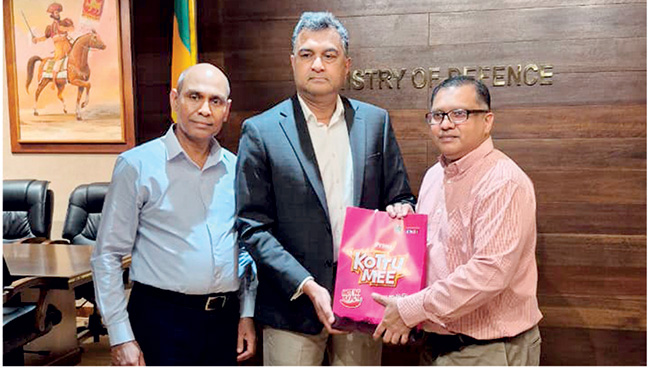
Prima Group Sri Lanka has pledged assistance valued at over Rs. 300 million, providing essential Prima food products to support communities affected by the recent floods across the island. This relief initiative is being coordinated through the Ministry of Defence to ensure the timely and effective distribution of aid to impacted families.
As part of this commitment, Prima Group Sri Lanka donated a significant stock of Prima dry rations to the Government of Sri Lanka on 30 November. The consignment will be distributed across multiple severely impacted districts. These supplies will support families facing disruptions to daily life, ensuring they receive assistance as recovery efforts continue.
The handover took place at the Ministry, where the donation was received by the Secretary of Defence, Air Vice Marshal (Retired) Sampath Thuyacontha. Representing Prima Group Sri Lanka, Sajith Gunaratne – General Manager of Ceylon Agro Industries Limited, and Sanjeeva Perera – General Manager of Ceylon Grain Elevators PLC, officially presented the donation.
Prima Group has been standing with the people of Sri Lanka for over 40 years, and this donation reflects its broader commitment to the nation during challenging times. As relief operations continue across the island, the company remains focused on helping families rebuild their lives and supporting the ongoing recovery process in collaboration with the Government Authorities.
-
News4 days ago
Lunuwila tragedy not caused by those videoing Bell 212: SLAF
-

 News3 days ago
News3 days agoLevel III landslide early warning continue to be in force in the districts of Kandy, Kegalle, Kurunegala and Matale
-

 Latest News6 days ago
Latest News6 days agoLevel III landslide early warnings issued to the districts of Badulla, Kandy, Kegalle, Kurunegala, Matale and Nuwara-Eliya
-
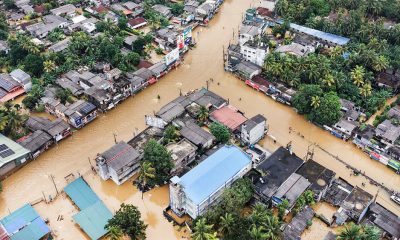
 Features5 days ago
Features5 days agoDitwah: An unusual cyclone
-

 Latest News6 days ago
Latest News6 days agoUpdated Payment Instructions for Disaster Relief Contributions
-

 News1 day ago
News1 day agoCPC delegation meets JVP for talks on disaster response
-

 News1 day ago
News1 day agoA 6th Year Accolade: The Eternal Opulence of My Fair Lady
-

 Latest News7 days ago
Latest News7 days agoLandslide Early Warnings issued to the Districts of Badulla, Colombo, Gampaha, Kalutara, Kandy, Kegalle, Kurunegala, Matale, Moneragala, Nuwara Eliya and Ratnapura


